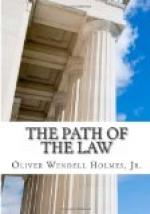Since I wrote this discourse I have come on a very good example of the way in which tradition not only overrides rational policy, but overrides it after first having been misunderstood and having been given a new and broader scope than it had when it had a meaning. It is the settled law of England that a material alteration of a written contract by a party avoids it as against him. The doctrine is contrary to the general tendency of the law. We do not tell a jury that if a man ever has lied in one particular he is to be presumed to lie in all. Even if a man has tried to defraud, it seems no sufficient reason for preventing him from proving the truth. Objections of like nature in general go to the weight, not to the admissibility, of evidence. Moreover, this rule is irrespective of fraud, and is not confined to evidence. It is not merely that you cannot use the writing, but that the contract is at an end. What does this mean? The existence of a written contract depends on the fact that the offerer and offeree have interchanged their written expressions, not on the continued existence of those expressions. But in the case of a bond, the primitive notion was different. The contract was inseparable from the parchment. If a stranger destroyed it, or tore off the seal, or altered it, the obligee count not recover, however free from fault, because the defendant’s contract, that is, the actual tangible bond which he had sealed, could not be produced in the form in which it bound him. About a hundred years ago Lord Kenyon undertook to use his reason on the tradition, as he sometimes did to the detriment of the law, and, not understanding it, said he could see no reason why what was true of a bond should not be true of other contracts. His decision happened to be right, as it concerned a promissory note, where again the common law regarded the contract as inseparable from the paper on which it was written, but the reasoning was general, and soon was extended to other written contracts, and various absurd and unreal grounds of policy were invented to account for the enlarged rule.
I trust that no one will understand me to be speaking with disrespect of the law, because I criticise it so freely. I venerate the law, and especially our system of law, as one of the vastest products of the human mind. No one knows better than I do the countless number of great intellects that have spent themselves in making some addition or improvement, the greatest of which is trifling when compared with the mighty whole. It has the final title to respect that it exists, that it is not a Hegelian dream, but a part of the lives of men. But one may criticise even what one reveres. Law is the business to which my life is devoted, and I should show less than devotion if I did not do what in me lies to improve it, and, when I perceive what seems to me the ideal of its future, if I hesitated to point it out and to press toward it with all my heart.




